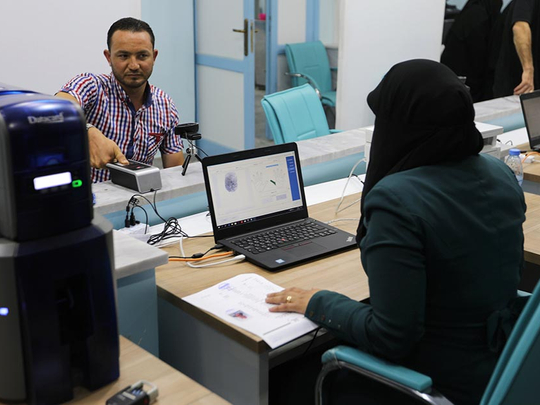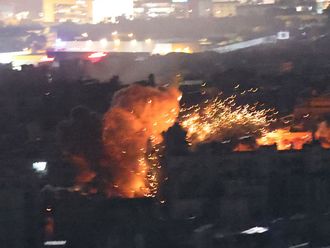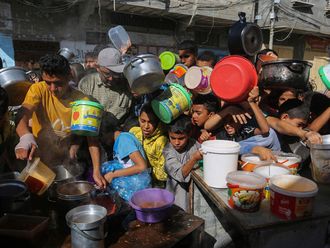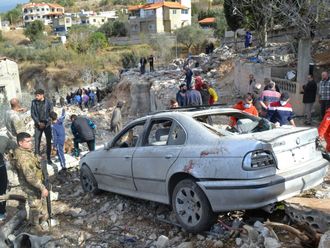
Beirut: “That’s it? You’re sure he’s dead?”
Seven years had passed with no news, but Salwa could hardly believe her nephew, a Syrian activist arrested in 2011, had been dead in the last five years.
The civil records employee shuffling through papers at her desk said: “Yes, we received the names of everyone who died inside prison.”
Tens of thousands of people are estimated to be held in regime jails across Syria, with relatives and advocates saying they are often tortured, denied fair trial, and deprived contact with families.
Their relatives are left in limbo, spending years and precious savings shuttling between security services to know where loved ones are held or if they are even alive.
A growing number of families, in different areas in Syria, are being informed of the death of their children in the prisons of the Syrian regime through mere coincidence. One would be issuing some formal paper work to discover that his detained son or brother in state prison, is registered dead under the civil registry.
As words started to spread, people started to flood the state civil departments to check for a detained relative status in the official registry with queues backing up for hours.
Bashar Al Assad last month ordered prisons and detaining centers to update their registries, but people never expected that death certificates would not reach them, and that they would have to find out by coincidence.
Now, activists and families of imprisoned Syrians say the regime has quietly updated civil records to mark detainees as “deceased”, backdating deaths to as long ago as 2013.
The Syrian Network for Human Rights (SNHR) estimates 80,000 Syrians were ‘made to disappear’ by the regime.
“Before, the regime would give no details on the detained. It wouldn’t declare them dead,” head of the Syrian Network for Human Rights Abdul Gani told AFP. “Now it is, but in a barbaric way.”
The city of Hama’s records were updated first, followed by Homs, the capital Damascus, Latakia and Hasakeh, and new names are still arriving at registries, the SNHR said.
In seven years of documenting Syria’s uprising-turned-war, Abdul Gani said he had never before seen families learn of the fate of the detainees in this way. “Usually, you take a death certificate to the registry and inform them your relative is dead, not the other way around,” he said.
Death certificates were sent from the Ministry of Interior to the Civil Registry Department and then to the Civil Registry chapters in different cities.
The certificates came mainly from Darayya, Ma’damiyeh and Hama prisons. Death certificates were issued by the military hospitals. The cause stated was “death from contagious and infectious diseases.” Many former prisoners said fractures and open wounds caused by brutal torture sessions led to infectious diseases and death.
Other death certificates stated: “On the basis of the decision of the First and Second Field Courts.” This meant they were executed after a the ruling by the Field Court.
Silent condolences
Salwa and her sister-in-law worried they’d be the only people at the registry asking about imprisoned relatives. “But when we got there, we saw a line out the door,” she said.
“Most were women, mothers and sisters of detainees. Security forces stood among them, and every single woman was wiping her tears and covering her face with her scarf.”
Weeping, Salwa went home to hold a single day of hushed condolences for two nephews: Sa’ad, arrested in 2011 and marked deceased in 2013, and Saeed, detained since 2012 and recorded to have died last year.
The family had no bodies to bury and was afraid of grieving publicly in a regime-held city.
“They scorched our hearts — those two boys were like roses. Even in mourning, we’re afraid and hide our grief,” Salwa said.
My son is at peace
The last time Islam Dabbas’s family saw him was late 2012, behind bars at a regime prison near Damascus.
“We stopped hearing anything a while after that,” recalled his brother Abdul Rahman, who has since moved to Egypt.
This month, a relative still in Syria learnt of the updated files and checked Islam’s.
“It said he died on January 15, 2013 in Saydnaya,” Abdul Rahman said.
“Honestly, it’s a relief. My mother told me, ‘He’s lucky. He’s at peace,’” Abdul Rahman said.
They held condolences for Islam last week in Egypt, hundreds of kilometers from home and without a body.
Death status not enough, body is needed
But confirming what many long suspected is not enough, said Noura Gazi, a Syrian lawyer and member of the detainee advocacy group Families for Freedom. “OK, you’ve told us they’re dead, but we want to know where the bodies are. We want to know the real way they died,” Gazi said. Others are hesitating.
“People are so tired. Of course, there’s denial. Others are suspicious, saying ‘Why would we believe this document is real? Or this date to be true?’” said Gazi, who lives in Beirut.
Her husband, activist Bassel Khartabil, vanished after his October 3, 2015 arrest. In 2017, through her networks, Gazi confirmed he died in regime detention.
“I held condolences for him, I wore black. I thought I had processed the truth,” she said.
That changed when a relative of Khartabil visited a Damascus registry in early July and saw the regime’s freshly-recorded date of death: October 5, 2015.
“When we saw that, it’s like he died all over again,” said Gazi.
“There’s no going back. For more than two years I fought to know his fate. Now I’ll be fighting my whole life to get his body.”
The heaviest price paid in civil wars was by families, who live in limbo for years and years, looking for answers to the fate of their beloved, detained, kidnapped, or dead
- With inputs from AFP












